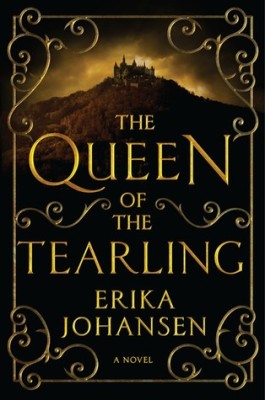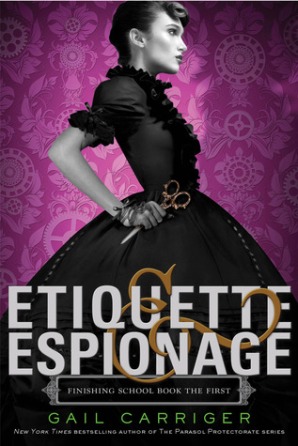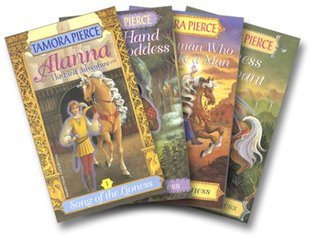
An untested young princess must claim her throne, learn to become a queen, and combat a malevolent sorceress in an epic battle between light and darkness in this spectacular debut—the first novel in a trilogy.
Young Kelsea Raleigh was raised in hiding after the death of her mother, Queen Elyssa, far from the intrigues of the royal Keep and in the care of two devoted servants who pledged their lives to protect her. Growing up in a cottage deep in the woods, Kelsea knows little of her kingdom’s haunted past . . . or that its fate will soon rest in her hands.
Long ago, Kelsea’s forefathers sailed away from a decaying world to establish a new land free of modern technology. Three hundred years later, this feudal society has divided into three fearful nations who pay duties to a fourth: the powerful Mortmesne, ruled by the cunning Red Queen. Now, on Kelsea’s nineteenth birthday, the tattered remnants of the Queen’s Guard—loyal soldiers who protect the throne—have appeared to escort the princess on a perilous journey to the capital to ascend to her rightful place as the new Queen of the Tearling.
Though born of royal blood and in possession of the Tear sapphire, a jewel of immense power and magic, Kelsea has never felt more uncertain of her ability to rule. But the shocking evil she discovers in the heart of her realm will precipitate an act of immense daring, throwing the entire kingdom into turmoil—and unleashing the Red Queen’s vengeance. A cabal of enemies with an array of deadly weapons, from crimson-caped assassins to the darkest blood magic, plots to destroy her. But Kelsea is growing in strength and stealth, her steely resolve earning her loyal allies, including the Queen’s Guard, led by the enigmatic Lazarus, and the intriguing outlaw known simply as “the Fetch.”
Kelsea’s quest to save her kingdom and meet her destiny has only just begun. Riddled with mysteries, betrayals, and treacherous battles, Kelsea’s journey is a trial by fire that will either forge a legend . . . or destroy her.
[Warning: this book contains adult themes and language. Reader discretion is needed, especially for younger audiences.]
Normally, my initial impressions of a book tend to last for the rest of it but sometimes my final feel about it takes such a drastic turn that it’s almost like I finished a title altogether. In my Currently Reading for The Queen of the Tearling, I mentioned that it had a decent pace and was action-packed but I guess I must have been a bit off my rocker since, upon final reflection, the book is one of the slowest I’ve read in months. It doesn’t help, too, that nothing actually really happens for the whole book. There is a lot of travelling, with smatterings of fights and some vaguely sassy political intrigue (that…isn’t very intriguing).
The plot and pacing isn’t unreadable per se – I am crazy impatient when it comes to reading and I still managed to finish this long tome with tiny fonts. It’s just that Johansen seemed to spend too many words describing too little things. Everything could have just as easily been accomplished in half the number of pages.
Much of the book is quite unbelievable too (a rather remarkable feat, considering the amount of disbelief suspension that usually accompanies fantasy titles). The queen’s royal guards are comically inept at actually protecting her, despite the narrative posturing that seems to puff them up at any opportunity (save a coin every time it is mentioned how fearsome Mace is and see if you don’t end up with enough to buy yourself a treat by the time the book is halfway through) and the queen’s jewels seem to be able to do any exact thing the story requires to resolve a particularly sticky situation. And then, there is Kelsea herself.
Firstly, it’s quite ridiculous how everyone seems to be so enamoured by her Queening abilities from the moment they set eyes on her, without any actual evidence of the fact. Then, despite professing not knowing what to do or how to handle many of the problems thrown at her (and having no actual experience in politicking), Kelsea always seems to be able to say and do the exact right thing at the exact right time (even if that that thing happens to be her acting like a spoilt brat that somehow ends up showing that she has backbone).
Johansen seems to be confusing strength of character with acting irrationally due to rage – gumption and assertiveness is not the same as recklessness. Most of the time, Kelsea doesn’t have concrete plans on how she is going to solve a particular issue, relying instead on the classic narrative cliche of “Acting/Speaking without Thinking, and Letting the Plot Sort Itself Out”. For such a celebrated queen who increasingly impresses those around her with her actions, she makes a remarkable amount of hasty, ill-thought-out decisions that don’t stand up to any sort of logical breakdown and that just turn out to be the right ones because Story. I mean, the moment she stepped into power, she undid an ages-long practice simply because she couldn’t stomach the emotion of it, despite the fact that, deplorable though the practice was, getting rid of it without any kind of follow-up plan would lead to an even more horrifying eventuality – war against a more powerful army. I’m not saying that she shouldn’t have done it. It’s just that doing it for her reasons, and without having spared any thought to what would happen and what would need to be done after, is plain stupid.
Equally unbelievable is the worldbuilding. A large chunk of the book seems to be written as a pure fantasy, until the sudden mention of ebooks, Lord of the Rings, and J.K. Rowling abruptly point to the fact that this series is set in what appears to be some sort of dystopia. That strange shift is never fully explained, and the fact that the book just continues trudging on its clearly medieval setting (replete with melee weapons like swords and maces, armour, and horses as the main mode of transport) while randomly throwing up concept like genetics and organ transplant surgeries is plain disorienting. While I’m all for novel settings, it’s unsettling to do so without any explanation as to how and why it came to be this way.
To be fair, the book is clearly not written to stand on its own. There are more questions raised every chapter that will presumably be answered in the next few books, the most pertinent of which is how this strange fantasy dystopia came to be and what exactly the Queen’s jewels do beyond being the Most Convenient Plot devices since Christopher Reeves flew around the world to reverse time in Superman.
Despite the reasons listed above, I inexplicably still finished the book (which I don’t always do with slow pacers) and I still want to give the sequel a go. It may be pretty terrible, but something, an extra-strength suspension of disbelief (and common sense) maybe, just made me continue reading till the end. It still leaves a terrible aftertaste though, getting worse the more one thinks about the holes in the story.
I shall reserve full judgment of this series until I’ve read the later books but regardless of how the rest of the series might go (and despite the fact that I continued reading it despite not thinking great of it), this title definitely won’t be appearing in my 2016 favourites list.
Rating: buy/(a very low) borrow/bin

